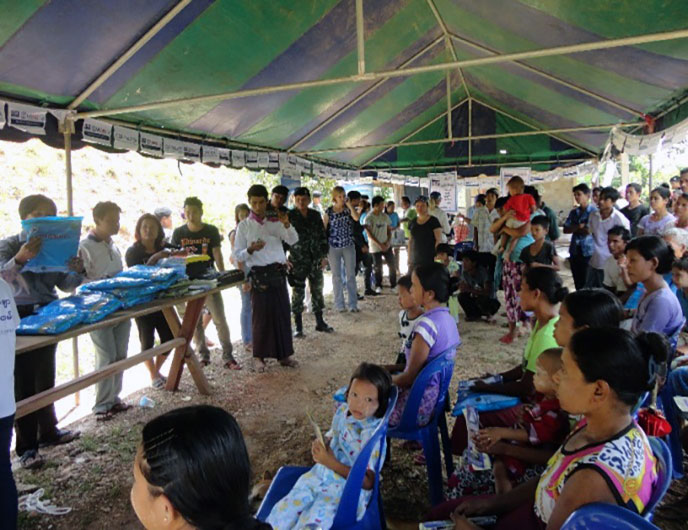
PMI project staff and a Malaria Inspector from Kawthaung (Burma) provide instruction to Burmese migrant workers on how to use long-lasting ITNs during a community malaria event in Ranong (Thailand). Credit: USAID/Thailand
To provide better access to malaria services for both local residents and for migrants in Ranong Province, the President’s Malaria Initiative (PMI) supported provincial and district health offices to expand malaria service outlets at the community level. With PMI’s support, new Malaria Posts were established and, at existing health facilities, malaria services were integrated together with primary health care. Sign posts along roads direct patients to the service site, where a trained malaria worker provides malaria diagnosis using rapid diagnostic tests (RDTs) and treatment with artemisinin-based combination therapies (ACTs) for positive cases. Malaria workers reinforce the importance of taking the entire three-day treatment to their clients using information, education, communication materials written in both Thai and Burmese. Patients also receive a patient treatment card in Thai and Burmese, which they can show to other health providers they visit either in Thailand or Burma.
Malaria Posts are located in a malaria worker’s home, strategically located in endemic villages near border crossings so that migrants can easily stop by for malaria diagnosis and treatment. PMI-supported staff from Kawthaung (Burma) have trained health volunteers among the migrant population to provide malaria education, distribute long-lasting insecticide-treated mosquito nets (ITNs), help bring migrants with fever in for testing and assist with follow-up visits to those migrants who test positive for malaria. As health services are still being developed in Burma, events have been held to extend malaria services for families and rubber plantation workers on the Burmese side of the border (e.g., long-lasting ITN distributions and malaria diagnostic testing). During the past year, 1,420 local Thai residents and migrants have been tested for malaria, and the 34 patients who tested positive were treated with ACTs according to Thailand’s national treatment guidelines.
